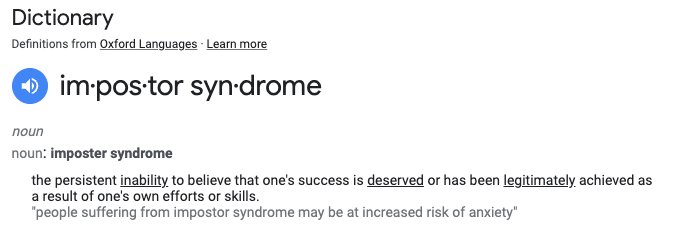
Impostor syndrome affects individuals from all walks of life. It’s characterized by persistent feelings of self-doubt, inadequacy, and the fear of being exposed as a fraud despite evidence of your accomplishments and capabilities. If you find yourself struggling with imposter syndrome, this post is for you.
Recognize
The first step in overcoming imposter syndrome is to acknowledge its presence in your life. Understand that impostor syndrome is a common experience and that many successful individuals have faced similar feelings of self-doubt. By acknowledging its existence, you take the first step towards challenging its grip on your reality.
Challenge
Imposter syndrome often stems from negative self-talk and overly critical inner voice. Start challenging your inner critic by questioning the validity of your negative thoughts. Ask yourself for the evidence that supports your accomplishments, skills, and abilities. Focus on your strengths and achievements, reminding yourself of your unique qualities as well as the hard work you have put into reaching your current position.
Find Support
Also, don’t suffer in silence! Reach out to a friend, family member, or mentor who can provide support and encouragement. Share your feelings of self-doubt and vulnerability. You’ll likely find that they have experienced something similar and can offer valuable insights. Surrounding yourself with a supportive network can help dimish the power of impostor syndrome.
Self-Compassion
Another thing you can do is practice self-compassion by treating yourself with kindness and understanding. Recognize that making mistakes is apart of the human experience. When facing challenges or setbacks, treat yourself as you would a friend – offer words of encouragement, support, and understanding. Celebrate your achievements, no matter how small, and give yourself credit for your efforts.
Reframe Failure
Try to shift your perspective on failure. Instead of viewing it as evidence of your incompetence, reframe it as an opportunity for growth and learning. Understand that setbacks and mistakes are stepping stones to success. Embrace a growth mindset that focuses on continuous improvement. See challenges as opportunities to develop new skills and expand your knowledge.
Celebrate
Take your time to acknowledge and celebrate your successes, big or small. Create a habit of keeping a record of your achievements, such as a journal or sucess jar. Reflecting on your accomplishments can serve as a reminder of your capabilities to help counteract feelings of self-doubt.
Learn & Develop
Invest in your person and professional development to build confidence. Pursue opportunities for learning. It could be a workshop, taking courses, or seeking guidance from mentors. By expanding your knowledge and skill set, you increase your competence and reinforce a positive self-image.
Embrace Vulnerability
Accept that vulnerability is an inherent part of growth and success. Take steps outside of your comfort zone, even if they make you feel uncomfortable or uncertain. Taking action despite your fears, you gradually build resilience and confidence in your abilities.
Beating imposter syndrome requires patience, self-compassion, and commitment to personal growth. Remember that everyone experiences self-doubt at times, but it doesn’t define your worth.


